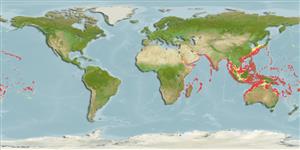>
Eupercaria/misc (Various families in series Eupercaria) >
Lutjanidae (Snappers) > Etelinae
Etymology: Etelis: Greek, etelis, -idos = a fish, perhaps the fish Sparus aurata (Ref. 45335).
More on author: Valenciennes.
Environment: milieu / climate zone / depth range / distribution range
Ökologie
seewasser riff-verbunden; tiefenbereich 45 - 400 m (Ref. 9821), usually 90 - 400 m (Ref. 9821). Deep-water; 38°N - 32°S, 29°E - 139°W
Indo-Pacific: East Africa eastward to the Hawaiian Islands, north to Sea of Japan, south to Australia (Queensland and New South Wales) and Lord Howe Island; off Kermadec Islands, northeast of New Zealand (Ref. 9821). Reported from the Marquesas (Ref. 114223). The name Etelis carbunculus has been misapplied to this species by some previous authors.
Length at first maturity / Size / Gewicht / Alter
Maturity: Lm 66.3, range 52 - ? cm
Max length : 120 cm TL Männchen/unbestimmt; (Ref. 5484); common length : 50.0 cm SL Männchen/unbestimmt; (Ref. 9821)
Rückenflossenstacheln (insgesamt) : 10; Rückenflossenweichstrahlen (insgesamt) : 11; Afterflossenstacheln: 3; Afterflossenweichstrahlen: 8. Interorbital space flat. Maxilla covered with scales. Dorsal and anal fin bases without scales. Upper caudal lobe becoming greatly elongated with increased growth. Scale rows on back parallel with lateral line. Back and upper sides deep pink to red; lower sides and belly pink; fins pink to red.
Adults inhabit rocky bottoms (Ref. 30573) of the continental shelf and continental slope (Ref. 75154). Benthopelagic (Ref. 58302). Feed on small fishes, squids and crustaceans (Ref. 30573). Considered an important food fish in some areas. Marketed fresh and frozen (Ref. 9987). Highly valued for the quality of its flesh (Ref. 11888). Mnimum depth from Ref. 089972.
Life cycle and mating behavior
Geschlechtsreife | Fortpflanzung | Ablaichen | Eier | Fecundity | Larven
Allen, G.R., 1985. FAO Species Catalogue. Vol. 6. Snappers of the world. An annotated and illustrated catalogue of lutjanid species known to date. FAO Fish. Synop. 125(6):208 p. Rome: FAO. (Ref. 55)
IUCN Rote Liste Status (Ref. 130435: Version 2024-2)
Bedrohung für Menschen
Harmless
Nutzung durch Menschen
Fischereien: hoch kommerziell; Sportfisch: ja; Köder: occasionally
Tools
Zusatzinformationen
Download XML
Internet Quellen
Estimates based on models
Preferred temperature (Ref.
123201): 9.9 - 24.8, mean 17 °C (based on 829 cells).
Phylogenetic diversity index (Ref.
82804): PD
50 = 0.5625 [Uniqueness, from 0.5 = low to 2.0 = high].
Bayesian length-weight: a=0.01660 (0.01347 - 0.02044), b=2.95 (2.89 - 3.01), in cm total length, based on LWR estimates for this species (Ref.
93245).
Trophic level (Ref.
69278): 4.4 ±0.2 se; based on diet studies.
Widerstandsfähigkeit (Ref.
120179): niedrig, Verdopplung der Population dauert 4,5 - 14 Jahre. (K=0.12; tmax=20).
Fishing Vulnerability (Ref.
59153): Moderate to high vulnerability (45 of 100).
Nutrients (Ref.
124155): Calcium = 5.05 [2.53, 11.76] mg/100g; Iron = 0.208 [0.098, 0.492] mg/100g; Protein = 18.9 [17.0, 20.7] %; Omega3 = 0.224 [0.114, 0.423] g/100g; Selenium = 12.7 [5.2, 31.1] μg/100g; VitaminA = 35.8 [6.8, 215.2] μg/100g; Zinc = 0.242 [0.151, 0.381] mg/100g (wet weight);
